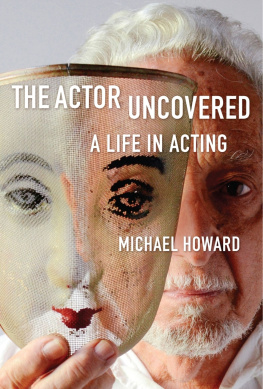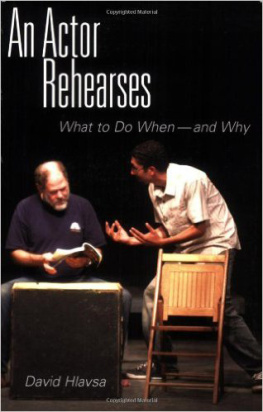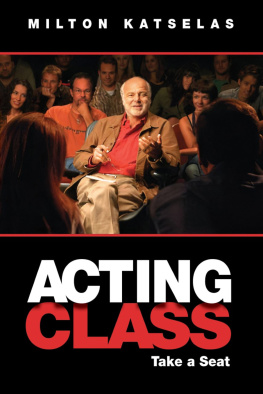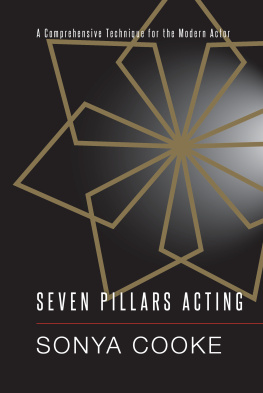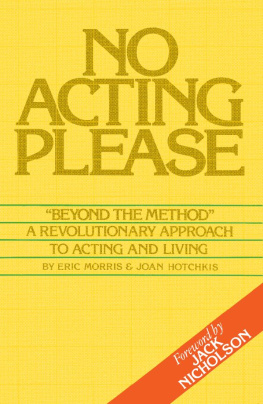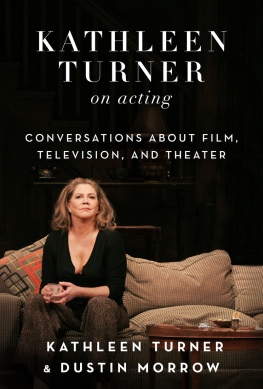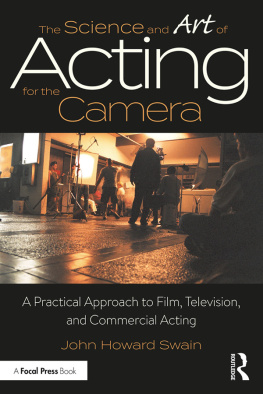I would like to thank my agent, Kevin Huvane. I cant resist. Its one of those things Ive always wanted to say. Kevin is Managing Director and Partner at Creative Artists Agency (CAA), and hes been part of my professional life since the mid-1980s. It never occurred to him that I would write a book, but when I told him I had, he immediately hooked me up with Mollie Glick in CAAs New York office. Mollie got me to Applause Books, where I had always hoped to be published.
The first people to slog their way through an early draft of this book were my former colleague John Vansteen and my fellow Grace Choral Society member Susan Knopf. There was so much book in that first draft, Im in awe they made it through. Both of them were enormously encouraging and gave me great advice. As did my writer friend, Mark Donnelly, who suffered through countless emails with the subject heading: Does this paragraph make sense?
My best friends in collegeJack, John, Tim, Garland, Kathy, Sally, McLure, Greg, Sharon, Chipwere all obsessed with the theater, which made my early theater days very productive. All I had to do was climb on the prom float with them. Because none of us came from a theater background, we were forced to learn from each other. Each others mistakes and insights, I should say. My early jobs, assisting Gerald Freedman, John Morris, and later Lee Grant, opened me up to a professional world that cared about theater as a creative collaboration. And my friend Margo Martindale, who was in the first play I directed, challenged me to step up my game.
When I met Stella Adler in the summer of 1976, my entire sense of theater changed. She was the embodiment of the nobility of studying an artform and I longed to be a part of it. I was like the newly converted. I moved immediately to New York and began what would be an extraordinary fifteen years of studying and learning from a true master. I accidentally slipped into teaching because my friend, Grant Show, was auditioning for a play and he was looking for some help. Suddenly there was the opportunity for me to pass on to someone else what Id been learning in Stellas classes. I found a place where I belonged. After an amusing disagreement with Stella about what would eventually happen to the Gentleman Caller in Glass Menagerie, she pointedly announced, I want you to teach for me.
I have been extremely fortunate along the way with my many co-conspirators, whove allowed me to try and fail and try again and succeed and then fail again and Well, I think its what we call a life in the theater. Tim and Bonnie, Ruffalo and Thornton, Kenny, Anthony, Kristina, Thor, Joanne, Susan, May all of these incredible people who gave me permission to grow and learn when I first started teaching. I also owe a debt of gratitude to Deb Margolin, who unrelentingly questioned me about my understanding of acting concepts as I drove her to Yale for a semesterand to Sharon Carnicke, one of my most cherished colleagues. I owe them all.
The idea for this book came from a series of email exchanges that began in about 2007. I like email. It feels like Im having a conversation with one of my students, or a class, or the cast of a play. Corresponding through email forced careful, cogent writing and communicating. Not that all of the emails in my book are overly thought-out or complete. I consider the study of acting always to be a work in progress. Its a journey that Ive had the great privilege of sharing with countless actors. But for the present, thank you: Abel, Akende, Alex, Blake, Cameron, Chris, David, Edward, Erika, Evan, Garrett, Giancarlo, Grant, Greg, James, Jay, Jean, Jenna, Jesse, JP, Justin, Justine, Kaleb, Karim, Kevin, Kyra, Mark, Maia, Marie, Matt, Mel, Michelle, Mo, Noah, Nick, Paul, Peter, Raphal, Robin, Teddy, Teo, Theresa, Tim, Tony, Victoria, Walker, Wesley the many, many actors who have dug into this work with me and struggled to find an answer to the overwhelming question: what does it take to become an actor?
1
Some Fundamentals
Some thoughts as we enter our first class.
Having a specific relationship to every aspect of the world of your play is essential to acting. Quite simply you must be connected to everything you talk about. When youre not, it sounds like a grocery list. And if what youre talking about means nothing to you, it will mean nothing to the audience and theyll nod off. Or, in the case of many a production Ive seen, you hope you can nod off. Quite simply, you must be connected to everything youre talking about.
In November of 1976 on the occasion of the opening of the film Rocky there was a half-page headline on the front page of some New York paper.
SYLVESTER
STALLONE
The New
Brando
We might look back in horror at the idea that someone could think this might be possible, but Stallones performance in Rocky blew people away. At the time this headline appeared, I was one of the producers of what would become one of Tennessee Williams few Broadway flops, Vieux Carre. While riding in a taxi with Mr. Williams on the way to a rehearsal, with that raspy Southern accent of his, Tennessee asked me, You know that new Italian boy? Stallone? Of course I did. He continued, Im thinking of letting him have the rights to do a new Streetcar.
Sylvester Stallone as Stanley Kowalski?!? If someone were to suggest something like that today, it would seem ludicrous, but at the time we had only seen Stallone in one film, Rockyand we loved him in it. Obviously, Tennessee did.
The idea of Sylvester Stallone as the new Brando defines a great truth in acting: an audience responds to an actors connection to the world of the play. The audience feels what the character feels.
If the character is in love, the audience should be in love. If a character is outraged at the injustices of capitalism, then the audience should be as well. If the character is being crippled by his family pressure, then the audience must feel the same. Sylvester Stallones Rocky had a passionate connection to everything about the world he portrayed in Rocky. He was connected to the plot, the relationship to his girlfriend, the city of Philadelphia, and certainly with his characters passion for boxing. All of it. And it was not some intellectual connectionStallones soul was connected to Rocky Balboa and Rocky Balboas world.
The necessity of being connected is true for every play, every film, every television show. When an actress playing Nora in Ibsens A Dolls House really understands, connects, and brings to life Noras problems, the audience will be unsettled because they will know what its like to be a woman who is only living for her husband and childrenand not for herself. It is powerful for an audience because they see and understand the problems of a human being called Nora. The power of the play comes from the actors connection to what the playwright is trying to say.
So where do we go wrong? The lack of connectionthe lack of experiencingstarts very early in the actors process. It starts the second an actor answers a question about a play in a dead tone. And Im talking about any question or comments about a play. The title. The author. Where the play takes place. Who you are. What you want. Absolutely anything connected to a play and the actors process that sounds dead fights against acting. Acting is not about answering a question correctly. I see a door has the possibility of either deadening you with its accuracyor bringing you to life because of a specific relationship to it.
QUESTION: Whats the name of your play?
ACTOR: (think of that dead tone, as if the actor is answering the question while texting) Long Days Journey into Night.
QUESTION: Whats it about?


